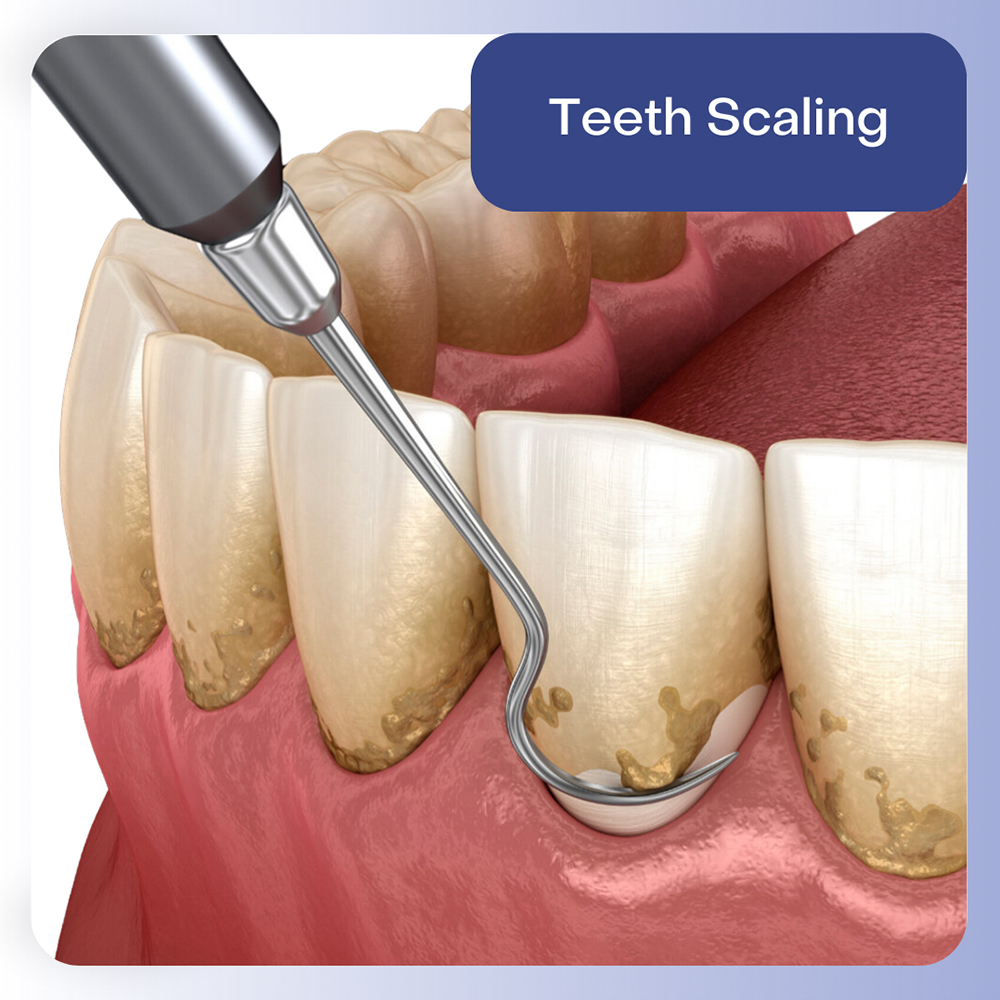Table of contents
 Deep dental cleaning is a procedure to eliminate tartar (hardened plaque) from all exposed tooth surfaces, including your tooth roots that are below the gumline. Advanced gum disease can cause gum recession, where gums pull away from your teeth, exposing the tooth roots.
Deep dental cleaning is a procedure to eliminate tartar (hardened plaque) from all exposed tooth surfaces, including your tooth roots that are below the gumline. Advanced gum disease can cause gum recession, where gums pull away from your teeth, exposing the tooth roots.
Gum recession creates periodontal pockets, which are gaps between your teeth and gums. These periodontal pockets can become quite deep as the gum recession worsens, and they create the ideal environment for harmful bacteria found in plaque and tartar to thrive. A deep dental cleaning helps eliminate these bacteria, creating a healthier environment so it is easier for your body to fight the infection that causes gum disease.
Periodontal disease is common, and many adults will develop some form of gum disease, and the risk increases with age. Other risk factors for periodontal disease include:
Gum disease can be silent, but its later stages can cause symptoms. If you have noticed any signs like bleeding gums, teeth that look longer than before, gums that feel sensitive, or swollen and red, please visit our dentistry office as soon as possible.
When you visit us for a dental exam, we will assess your gum health carefully. If you have signs of gum disease, we recommend you see our periodontist for a proper evaluation.
Dental x-rays or other diagnostic tests may be needed to check for signs of bone loss or other conditions affecting your gum health. The periodontist will measure the depth of any periodontal pockets around your teeth and assess your gum health before making their recommendations.
If you have any heart health conditions, we might recommend that you take antibiotics before this dental procedure. If necessary, we will liaise with your cardiologist to ensure you are cleared for this treatment or other treatments recommended for periodontal disease.
If you need a deep dental cleaning, it may be possible to complete the treatment during a single visit. Sometimes, we recommend treating just one or two sections of your mouth at a time to ensure you feel comfortable during this process. We can then treat the other sections during another visit.
Because your teeth are cleaned below the gum line, we may use a local anesthetic to numb your mouth before beginning treatment and ensure you do not feel discomfort. You remain awake for the entire procedure and split into two sections: teeth scaling and root planing.
A teeth scaling procedure is very similar to an ordinary hygiene appointment.
Root planing treats your exposed tooth roots just below the gumline.
We may place antibiotics directly into the periodontal pockets when an infection is particularly severe. Topical antibiotics help eliminate any remaining bacteria.
After treatment, your teeth and gums may feel slightly more sensitive. We will advise you on looking after your mouth before you leave our dental office.
While your mouth settles down, it’s best to avoid eating and drinking anything very hot or cold. Instead, stick to eating softer foods. We may recommend using an antimicrobial mouthwash. Over-the-counter pain relief should be enough to control any discomfort. If we have prescribed antibiotics or pain relievers, please take them as directed.
After treatment, you can expect your gums to look healthier and feel stronger gradually. They should bleed less frequently and fit more snugly around your teeth. During your follow-up appointments, we can measure the depth of your periodontal pockets to assess the effectiveness of treatment. If the pocket size hasn’t decreased, you may need to repeat this procedure or require surgical treatment to help control advanced periodontitis.
Deep dental cleaning is often recommended with other therapies like laser dentistry to help treat gum disease. You may need more than one deep dental cleaning to control advanced gum disease.
The cost depends on the extent of the infection, the time required to clean your teeth and gums, and the number of treatments needed. It is a cost-effective treatment because it can help prevent tooth loss. Treating periodontal disease also protects your overall health so that it might lead to lower medical bills in the future.
Most dental insurance policies will cover at least part of the cost of this treatment as it is necessary for dental health.
Deep cleanings are an effective treatment for periodontal disease and can help get you back on track for better oral health. Once periodontal disease is under control, it’s important to follow our family dentist’s or peeriodontist’s instructions on continuing oral care at home, including twice daily brushing and flossing every day.
Regular professional dental cleanings can help remove plaque and tartar before it can infect and inflame your gums. You cannot remove tartar at home, as only a periodontics professional has the right tools and expertise to clean your teeth professionally.

My name is Victoria Kushensky. I am a general dentist dedicated to remaining at the forefront of my field. Combining compassionate care with extensive knowledge, I offer cosmetic and general dentistry services as well as advanced root canal treatments.
I earned my Doctor of Dental Surgery (DDS) degree from the esteemed New York University College of Dentistry. Throughout my career, I have honed my skills in various dental procedures, ensuring effective treatment for each patient’s unique needs. I prioritize patient comfort and understanding, taking the time to thoroughly explain procedures and address any questions.
More about Dr. KushenskyMy NJ Dentist: Victoria Kushensky, DDS
385 Prospect Ave Suite 304
Hackensack, NJ 07601
(201) 298-8000